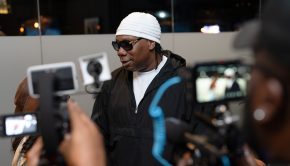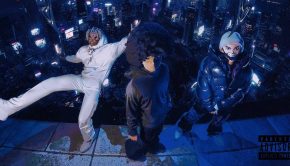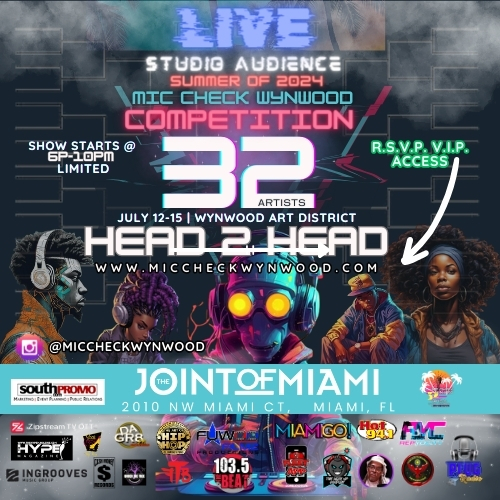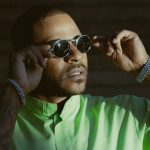Michael Pearce Talks About His Time As Head Of Yahoo Sports & Joining FanWagon
Michael Pearce is the former head of Yahoo Sports and during his time there he helped create and spearheaded the launch of Fantasy Football Live. The show would later go on to be nominated for two Emmy Awards. Also during his time at Yahoo Inc, Pearce was in charge of global event planning for the 2016 Olympics in Brazil, along with developing partnerships with other platforms such as, Turner Sports, NBC Sports, and MLB.
Other assignments that he has been the lead on includes seven Super Bowls, six Olympics and two World Cups, which, if you ask him, he will tell you the planning process was not easy due to having to set up work stations in locations blocks away from the events. Other times, having to spend countless hours explaining to event coordinators why they should be credential media members for events, even though they were a website based platform and not print.
Pearce left his position at Yahoo to join a Houston base gifting platform by name of FanWagon the app is available on iOS, Android and Xbox. He will be working alongside founder Dexter Talbert, VP Chris Meza, Head of Strategy Jon Hume, as well as former Apple employee Jonathan Lott.
Pearce recently spoke with us here at The Hype Magazine about his time at Yahoo Inc and how he became involved with FanWagon the app.
What were some of the jobs and internships you had before pursuing a career in Journalism?
You are going way back, I mean I was in television for 22 years before I worked for Yahoo. So, I was a journalist that whole time. I started as a reporter after I graduated from college, but I worked a lot of odd jobs to pay for college at Fresno State University. While I was in college, I did a couple of internships as I became interested in broadcast journalism radio and television. I did a couple of internships at the local ABC station in Fresno, California. After college, I landed a paid internship one year, and back then they were pretty rare, at the NBC station in Fresno.
What the paid internship allowed me to do was be more active in the day-to-day journalism. So, I was trained to do everything from writing stories to producing a newscast, and going out to assist with stories in the field. I was reporting on the air and sometimes filling in for the sports guy when he went on vacation and there wasn’t anyone else to fill in for him. So, for me, it was a thrill. And then, I really got my foot in the door in a small market in Kennewick, Washington. I was there for five years. I was able to develop myself as a reporter, and I did a lot more producing there. I would later become the assistant news director. It also exposed me to everything outside of being in front of the camera. From there, I was able to relocate back to Fresno with the Fox Station there. I was doing a variety of things reporting, producing, and running the news desk. I would later accept a full-time producers position with NBC in Fresno and I was then a producer at various stations for the next 10 years.
How did those experiences lead to the opportunity with Yahoo, and did you consider that to be your dream job at the time?
The first time that Yahoo called no, because it was just a specific job, but here is what lead me to get the role. One of the things I specialized in was organizing special events and significant coverages on television. For example, big election coverage, and sometimes, TV news is a 24-hour ongoing event. Where all the station’s resources are poured into one event like covering the elections. I must say I had some experience when I worked in Phoenix, and Sacramento, but I have never been in charge of those events. In San Jose, I was given the whole operation, and it was during the 2000 election between George W. Bush and Al Gore where it went on for weeks. It was unprecedented in American history and television history.
We could not go off the air, and we had to make some tough decisions like how long are we going to stay on each night. And that began on the process of me running coverage during big events. The next big event that happened was 9-11, and again my job was to organize our coverage nationally for the local station in the Bay Area but also coordinate with networks and stations groups we belonged to across the country. It required pooling resources and in all of the locations the story was happening, not just New York City, but Pittsburgh, and Washington DC. It was a huge story, and it still is, but there were numerous weeks of coverage. There was a flight( United Flight 93) from Boston; it was headed to San Francisco. The passengers broke down the door of the captain’s cockpit and tried to take back the plane. The hijacker ended up crashing the plane into a field. So that story was huge, and It still is. And they made a movie out of it.
So, there was this series of big coverage events, and it allowed me to learn to organize and send people on missions to cover those specific events with all the logistics that came with it. I was a freelancer at the time, and Yahoo sports called me and said, we’re sending our first team ever to the Olympic and Athens 2004. We need somebody who knows how to organize this. We need somebody to run the website, a unique website that we’re putting together. We need somebody to organize our team, develop are what we’re going to do, our planning and all of that. And so my first job was covering the Olympics for Yahoo Sports.
Can you tell us how you approached this project?
I had to build the team and support the team logistically by managing the team in Athens while controlling everything from the studio in Sunnyvale, California. So it was really like leading a team that’s overseas from your office desk. These were the days where your cell phone didn’t work in different regions of the world, and you had to get a particular cell phone for that region, and connecting to the internet was sketchy at best. There was a lot of calling in stories over the phone where we had to transcribe whatever the reporter was saying. It was a long process, and the studio was brand new then online, but the results were remarkable. What I was able to do was not just work on the specifics as detailed, but because of my experience working with networks and working with other stations. I was able to able to mold the forces of Yahoo around that project.
Can you talk about how you started the Fantasy Football Show with Yahoo?
A guy, who was running Yahoo Sports at the time asked me to develop a show for fantasy football. I didn’t know anything about fantasy sports. I was a traditional sports guy, and I focused on covering traditional sports in all of our shows at Yahoo. However, the small amount of time I spent producing clips for fantasy football were outperforming everything else. We flipped it around, and we started mass producing fantasy football content, scaling back on other things, and it opened the door for a lot of things for us. We landed our first sponsorship with Visa, and they became our sponsor of fantasy football. And then we launched a new show, which I developed literally on a napkin one afternoon.
Have you had the opportunity to sit back and reflect on some of the things that you were able to accomplish?
To create a live format to try things out that you just had as a wild idea. Let’s try it out! What I reflect on is I did not often stop and look at the successes. Look at all the awards, we got nominated for a National Emmy twice. We probably won four or five gold medals from New York Festivals, the World’s Best TV & Film Awards in Las Vegas. We were always pulling in awards for our content. We developed long-form content and mini-documentaries around the Olympics that were massively successful. We had a considerable impact on most of what was happening online in sports media. We shaped the way fantasy football is delivered. We had better numbers at Yahoo for coverage of big sporting events than all of the league-owned and operated websites, most of which eventually became our partners.
Can you talk about what it was like for you in regards to obtaining credentials?
Back when I first started, I couldn’t get a credential to save my life. I remember for years the NBA wouldn’t give us credentials even to the All-Star Game. We couldn’t get a credential to the World Cup or the Super Bowl, and we spent the first couple of years while I was at Yahoo, figuring out how to cover events without exactly attending the games. I remember sitting in a room with five people before our first Super Bowl and saying we were going to send a team to Miami. We don’t have broadcast trucks, all we have is our cameras and laptops. We had to do everything online and upload the videos on the spotty hotel internet because we could not get into the credentialed media workspace. Then there was a couple of big things that shifted. I remember talking to NASCAR; there was an event in the Bay Area. We wanted to get credentials because it was in our backyard and they were like, why the hell should we give credentials to a website? Eventually, we were able to convince them to give us a few credentials and then they saw the type of content we were creating both with writers and video. Also, people were responding and that we got a more of response online than they were getting, and that opens the door.
How did this process shift to events like the Olympics?
We had been covering the Olympics, but the moment that really shifted things happened in China. We went to the Beijing Olympics in 2008. A the time the person leading Yahoo Sports was Dave Morgan. Dave had worked out a way for us to share our workspace with the US Olympic Committee. So they have their workspace set up where people, all the journalists, would come every day and see what was available as far as stories, coverage, and access to athletes. We set up our video operations side-by-side with them. And again, most of us were uncredentialed. But, you couldn’t notice it from our coverage of the event, and they saw our work ethic and the type of content we created. They also saw the professional journalism that we did and literally at the end of the Olympics came and said to us, “anything you need we got your back”. Everything changed after that, and we were able to learn how to cover an event without being inside the venue to shoot it.
What was the reason that you decided to depart from Yahoo in 2014?
It was not my choice to leave Yahoo. There was a lot of different changes like Verizon purchasing the company, and I was a part of the first group that was laid off. At that point, things had changed and Yahoo Sports, they were no longer interested in doing the mission I had led. In the same way, they were looking to change the direction of video at the company. What happened at the end was that I became disconnected from what the company was up to. Video at Yahoo no longer became a brand-building experience. One of the things I was able to do was to help build their brand, to take a company that nobody knew about, and create an online sports phenomenon. You have to develop the company’s identity, and that was on the way out. The content was rarely exclusive anymore unless they were paying someone like Katie Couric big money. I’m grateful for the opportunity that Yahoo gave me while I was working there and because of that opportunity, I was able to make a name for them and myself. And that’s allowed me to dabble in many different things in the years since Yahoo.
How did you come across Fan Wagon?
One day I got a call from Dexter Talbert and Chris Meza, and they wanted me to talk to me about Fan Wagon. It was brand new, and it has given me an opportunity to play in the area of sports again, and I’m still very passionate about sports.
The reason it appealed to me because it offers fans a way to be involved again in something that is usually run by other people, whether it’s betting or wagering. Usually, you got to go through some big organization, and they’re running everything. With this, you put the control in the hands of the people. It’s interacting with people and looking at what’s going to work, and what’s not going to work. There is not a game that goes by where someone is not wagering their friends on a sports game. So with Fan Wagon, we embrace that and enable that through gifting. And we are prepared to move more aggressively into gambling as the new laws allow.
You’ve had the opportunity to cover numerous events such as the Olympics, seven Super Bowls, and have partnered with Turner Sports, NBC Sports, MLB, etc. During your time at Yahoo, what would you say was your toughest assignment and why?
I think the most robust assignment was the World Cup in Brazil in 2014. But really it was that whole year. The World Cup was the toughest, but we had the Olympics in Russia and the World Cup in Brazil, three to four months apart. Two massive missions in two foreign countries where it was not easy to get work done. It was difficult to negotiate the logistics. The regulations that you have to wade through were excessive and those countries didn’t offer a lot of support. I spent two years in planning for those missions, starting about two months after the London Olympics. So it was a challenging process and probably one of my toughest assignments while I was at Yahoo.
Tweet









































